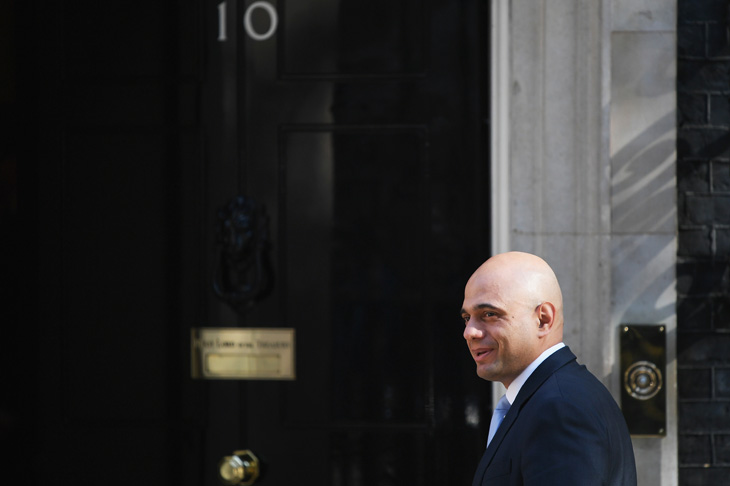Since being appointed Home Secretary, Sajid Javid has taken a series of bold and overdue decisions. On immigration, he understood that most people would like skilled doctors and nurses to come and work for the National Health Service, so he removed them from the cap that Theresa May had imposed on skilled workers coming to this country.
In his response to the case of Billy Caldwell, the severely epileptic boy whose fits were eased by cannabis oil, Javid brought political nous to a department that all too often lacks it. He recognised that if heroin could be prescribed for medical purposes without further undermining prohibition, the same could be true for cannabis. The oil’s efficacy is an open question, but at least Javid stopped the original plan: arresting the child’s distraught family at the airport, on charge of smuggling a banned substance.
His latest project is to make it easier for the police to stop and search people they suspect of carrying acid, for the purposes of a street attack. For too long, the debate over this matter has turned into one about race. This is despite the fact that Home Office officials had research showing that stop and search isn’t used disproportionately against minorities when you take into account who is actually on the streets. Javid’s willingness not to shy away from the issue but rather give the police the powers they need is welcome.
In all three of these cases, Javid has refused to follow the bureaucratic dogma inherited from May’s time in the Home Office. Given the close — some might say suffocating — interest the Prime Minister takes in her old department, this shows a refreshing independence of mind.
One of Javid’s advantages is that he does not owe the Prime Minister anything. It is well known in Westminster that he would have been sacked from the cabinet if she had won the convincing victory that her advisors expected when they opted for an early election. May only promoted Javid to Home Secretary after Amber Rudd’s resignation because it was the most effective way of keeping the Windrush scandal from her own door.
Javid’s behaviour during the May ascendancy marked him out. Hard as it is to remember now, there was a time when she was the most popular prime minister since records began. She was politically dominant and determined to change the whole nature of Conservative economic policy. She wanted to adapt huge chunks of Ed Miliband’s agenda and return the party to something close to the stultifying corporatism of the Heath era.
While several other cabinet ministers avoided speaking up about this, Javid consistently argued against it in cabinet and its committees. He was not deterred by any threats from May’s aides that this would cost him his job. His willingness to speak out in these circumstances showed that he is a politician of conviction.
Javid has been talked about as a potential Tory leader. Under David Cameron and George Osborne, he was fast-tracked into ministerial office and his own personal backstory — his father arrived at Heathrow from Pakistan in 1961 with just £5 in his pocket — distinguished him from the Tory pack. He became a vice-president at Chase Manhattan bank aged 25, and credits his success not just to the country but to the Conservative reforms that brought liberalisation and opportunity.
He is a far more formidable politician now than he was when he first made cabinet. He has begun to focus on why he is really in public life. Losing the patronage of the leadership has clarified his position. He has made his share of mistakes: he was seen to have wavered over Brexit and mishandled the crisis over the Port Talbot steel works. But having held six jobs in six years, such turbulence is normal. He can expect to be defined by the changes he is now making.
Before long, there will be a Tory leadership contest. As this magazine revealed last month, even those closest to May now accept that she won’t lead the party into the next election. The job of the next prime minister should be far bigger than Brexit. It should concern itself with addressing the crisis of capitalism that has still not been properly dealt with ten years on from the crash. It should also be about confronting a political environment where even thoughtful people like Justin Welby end up reaching for the soak-the-rich language of class war.
There is plenty for the Tories to say, if they could find someone with the requisite wit, verve and plausibility. Conservatives could, for example, point out that the tax cuts have — paradoxically — seen the 1 per cent pay 28 per cent of income tax, a figure that has never been higher. This ought to warm the heart of the most ardent redistributionist.
But if they vacate the field of argument, unable to discuss anything other than Brexit or each other, they should not be surprised if Jeremy Corbyn wins over archbishops and others with his tax-and-spend arguments.
Brexit was always a means to an end. The question is: what comes next? If Javid can set out an answer, he will be worth listening to.
Got something to add? Join the discussion and comment below.
Get 10 issues for just $10
Subscribe to The Spectator Australia today for the next 10 magazine issues, plus full online access, for just $10.
You might disagree with half of it, but you’ll enjoy reading all of it. Try your first month for free, then just $2 a week for the remainder of your first year.














Comments
Don't miss out
Join the conversation with other Spectator Australia readers. Subscribe to leave a comment.
SUBSCRIBEAlready a subscriber? Log in